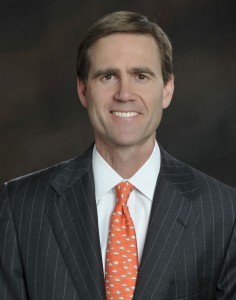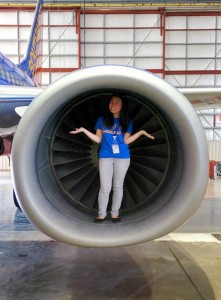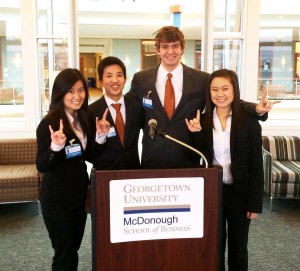 John Ward, BHP ’88, is a Managing Director at Accenture . His current role is Commercial Director for one of Accenture’s largest accounts and the Lead for other Commercial Directors in Accenture’s Communications, Media & Technology business unit in North America. John has been with Accenture for 15 years and, although he has had multiple opportunities to take other roles outside of Accenture, one of the primary reasons he has stayed is because of the company culture. Accenture is a BHP corporate partner and has several upcoming opportunities for BHP students. Applications for summer internships are due by October 8 and the Accenture Leadership Series application will open early next semester.
John Ward, BHP ’88, is a Managing Director at Accenture . His current role is Commercial Director for one of Accenture’s largest accounts and the Lead for other Commercial Directors in Accenture’s Communications, Media & Technology business unit in North America. John has been with Accenture for 15 years and, although he has had multiple opportunities to take other roles outside of Accenture, one of the primary reasons he has stayed is because of the company culture. Accenture is a BHP corporate partner and has several upcoming opportunities for BHP students. Applications for summer internships are due by October 8 and the Accenture Leadership Series application will open early next semester.
Take me through your career path leading up to working at Accenture.
When I graduated from UT, I knew I didn’t want to be an accountant or auditor, but I knew that two years at an accounting firm would help me understand accounting as the language of business, so I accepted a position with Arthur Andersen. I spent two years at Arthur Andersen in Dallas. Arthur Andersen met all of my expectations and I still have relationships that I formed there. I knew I wanted to go to a top-tier grad school, so eight months after marrying my college girlfriend we loaded up the moving truck and relocated to Philadelphia to attend the Wharton School of Business.
After Wharton, my wife and I wanted to move back to Texas, so I took a job in Finance and Corporate Development at American Airlines in Dallas. After four years of the airline business, I learned that it was a very difficult business for management to influence. I decided I wanted to be in a role where I could have more control and influence over the business, so I moved to a CFO role for a couple of different start-ups, one of which was a private equity investment fund. When a head hunter called about a role as the Portfolio Manager of Andersen Consulting’s venture capital fund, I couldn’t say no. In a lot of ways it was like going home because Arthur Andersen/Andersen Consulting, which eventually became Accenture, employed the same kind of people, so it was really easy for me to go back there.
I have been here for 15 years. I started as a portfolio manager, but after we went public in 2001, it was in 2002 that our shareholder came to us and told us we needed to sell the venture portfolio, which I was tasked with. After selling the portfolio, I had to make a decision as to whether to leave Accenture and stay in the investment world or remain at Accenture. I chose to stay because of the great corporate culture at Accenture.
After coming into Accenture, how did your role evolve?
After I sold the venture portfolio, the CFO asked me to stick around and said he would figure out something for me to do. The first thing he had me do was figure out how to manage compensation and benefits around the globe. I chartered Accenture’s first global compensation and benefits committee. I worked with HR to form a comp and benefits committee chaired by the COO at the time. We built processes around compensation and benefits for all 52 countries we were in. In that role, I met leaders in our business around the world and learned the business. It was a great introduction to Accenture as a whole.
The next big move was to move closer to clients, so I moved to the client I am on now, taking on more responsibility within that account over time. Three years ago, I was asked to lead the other commercial directors in our business unit, Communications, Media and Technology, for other clients.
You moved from working in industry to start-up to private equity. Do you feel your breadth of experience prepared you well for the management role you are in now.
As Commercial Director, I am the COO of Accenture’s relationship with one of its largest clients. In that role, I manage a finance team, a legal team, an HR team, a sales operations team and a business operations team. All of my experience with HR, legal, accounting, finance, strategy, etc. prepared me for this role.
What have you enjoyed the most and what is most challenging?
I enjoy the client interaction and helping my client achieve its objectives. I actually get energy from meeting with my clients. The most challenging part of the COO role is that I am often handed the most difficult problems that require tough client discussions, so that’s tricky, but I enjoy it. Those client bumps in the road are the biggest challenges and the most rewarding. My client’s problems become my problems and sometimes those discussions can get pretty challenging. When you deal with a large client, they expect big things and sometimes those are difficult discussions. My job is to remain unconditionally constructive and continue to find constructive outcomes. It helps to put yourself in your client’s shoes and understand the position they are coming from.
What do you enjoy most about working for Accenture?
The people and the corporate culture. We have incredible ethics. We hire good people and we treat them well. Not every company has the strong culture we have. We don’t mess around in the way we conduct ourselves. We have six core values which are: stewardship, best people, client value creation, one global network, respect for individual and integrity. These core values truly represents who we are. I see it day in and day out and people who don’t adhere to those values don’t last very long.
How did you feel BHP prepared you for the MBA curriculum at Wharton and what did you gain from earning your MBA?
I was fully prepared, so much so that I was asked to be a teaching assistant for two classes, which was great because it helped me pay for some of my grad school. I felt fully qualified to be there and BHP was really the ramp-up for that.
If a current BHP student is considering getting an MBA in the future, I recommend that they put it on the back burner for a while. An MBA isn’t something I would rush. Most importantly, you should have significant work experience before going to get your MBA. The benefits of getting an MBA are really more around the people you meet and using the curriculum to take it all to the next level. Much of the Business Honors Program is effectively a mini-MBA. . Take your BHP degree as far as you can in your career without getting the MBA, then go get it when you need something more or different. Don’t go get it straight out of BHP. Coming out of BHP, I wouldn’t do the MBA unless it is from a top-tier program. I knew I didn’t want to be an accountant, I wanted to be something different, so I felt I needed to go get my MBA.
Once you head down the MBA path, one piece of advice I wish I had received is not to place out of classes. You will most likely have the opportunity to place out of “core” classes in an MBA program and I would argue against that. If you place out of some of those core classes, you lose the opportunity to develop those relationships with your classmates.
What advice do you have for BHP graduates who are just starting their careers?
Choose an employer where you respect the people and the product or service. I call it the “take home to dinner” test. Find a culture of people you are comfortable with. Not just were they are nice or successful, but are they people you really want to associate with and take home to dinner with your family. Find a challenging industry/role where you can add value, grow your skills and use what you learned in BHP. Don’t be afraid to take risks. It is important to stay somewhere for a couple of years at least, but be open to trying new roles that aren’t in your comfort zone and stretch yourself. Also, establish a reputation of always doing a good job and being excellent at what you do. At the same time, keep some work life balance and maintain activities and interests outside of the company.
 Professor Bagchi may have made a circuitous path to the business industry, but he is no stranger in the field. He’s been teaching Operations Management for the last 39 years, with the last 36 years at UT. At McCombs, he teaches OM335H: Operations Management, OM337: Total Quality Management, and OM367: Strategic Supply Chain Management. Bagchi actually began his career as a Chemistry student; he received his B.Sc and M.Sc in Chemistry from the Indian Institute of Technology (Kharagpur), his M.S. in Chemistry at Washington State University, and a Ph.D in Operations Management from Pennsylvania State University.
Professor Bagchi may have made a circuitous path to the business industry, but he is no stranger in the field. He’s been teaching Operations Management for the last 39 years, with the last 36 years at UT. At McCombs, he teaches OM335H: Operations Management, OM337: Total Quality Management, and OM367: Strategic Supply Chain Management. Bagchi actually began his career as a Chemistry student; he received his B.Sc and M.Sc in Chemistry from the Indian Institute of Technology (Kharagpur), his M.S. in Chemistry at Washington State University, and a Ph.D in Operations Management from Pennsylvania State University.
 Dr. Joe Hahn teaches FIN 357H, which is Business Finance – Honors, in the fall semester. Along with teaching FIN 357H, Dr. Hahn also teaches FIN 372, FIN 374C, and he serves as the director of the MSF (Master of Science in Finance) program. One of Dr. Hahn’s favorite parts of teaching BHP students in FIN 357H is that BHP students are usually quite inquisitive, which helps foster lively discussions in class. Also, FIN 357H is one of the only Finance classes that BHP students who aren’t also majoring in Finance will take, so Dr. Hahn enjoys challenging these students’ assumptions about Finance and exposing them to the interesting theories and applications that could apply to their own fields of study.
Dr. Joe Hahn teaches FIN 357H, which is Business Finance – Honors, in the fall semester. Along with teaching FIN 357H, Dr. Hahn also teaches FIN 372, FIN 374C, and he serves as the director of the MSF (Master of Science in Finance) program. One of Dr. Hahn’s favorite parts of teaching BHP students in FIN 357H is that BHP students are usually quite inquisitive, which helps foster lively discussions in class. Also, FIN 357H is one of the only Finance classes that BHP students who aren’t also majoring in Finance will take, so Dr. Hahn enjoys challenging these students’ assumptions about Finance and exposing them to the interesting theories and applications that could apply to their own fields of study.

